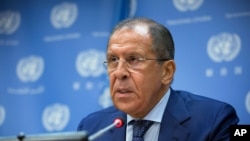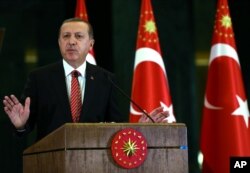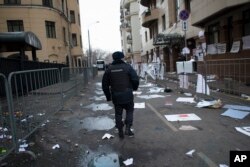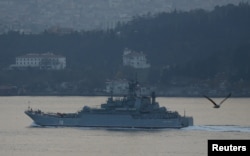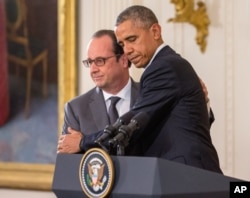Russian Foreign Minister Sergei Lavrov said Wednesday that Turkey's downing of a Russian warplane "looks like a planned provocation," but that Russia is not going to war with Turkey.
Lavrov said the incident will make Russia reconsider its relationship with Turkey. He canceled a planned trip to Turkey on Wednesday, but spoke with Turkey's foreign minister and the two agreed to meet in the coming days.
Separately, Russia's Foreign Ministry said in a statement Wednesday that Lavrov told Turkish Foreign Minister Mevlüt Çavuşoğlu in a phone call that in shooting down the Russian jet, Turkey's leadership "has, in essence, sided with" the Islamic State group.
Meanwhile, one of the pilots who parachuted from the Su-24 arrived Wednesday at a Russian base in Latakia after being rescued by members of the Syrian army.
Speaking to reporters there, he denied that the jet had entered Turkey's airspace "even even for a single second" and insisted that the Turkish authorities had issued "no warnings whatsoever" to the plane before it was shot down.
At an event Wednesday in Istanbul, Turkish President Recep Tayyip Erdogan said the plane crashed in Syria but was still inside Turkey's airspace when it was hit Tuesday
Other Turkish officials said that the plane was as deep as 2 kilometers over the border for about 17 seconds, and that its forces issued 10 warnings that were ignored before they fired.
Russia insists the plane never left Syrian territory.
US comment
Reuters quoted an unnamed U.S. official as saying Washington believes the Russian plane returned to Syrian airspace before being hit, while diplomats speaking to The New York Times said the plane crossed back into Syria after being hit.
Erdogan said his country was simply defending its security when Turkish fighter planes shot down a Russian jet, and that he does not want any escalation with Russia.
Likewise, Turkish Prime Minister Ahmet Davutoglu told lawmakers Turkey has no intention of straining ties with its "friend and neighbor" Russia.
Russian Prime Minister Dmitry Medvedev said Wednesday "dangerous escalation" in relations between Russia and NATO cannot be excused, even in the case of border protection.
President Vladimir Putin called the incident a "stab in the back" and accused Turkey of supporting terrorists.
Russia has announced several responses. Defense Minister Sergei Shoigu said Wednesday the military will send its advanced S-400 missile system to Syria's Latakia province, which borders Turkey. It is also deploying the guided-missile cruiser Moskva to the area.
Meanwhile, one of the pilots who parachuted from the plane arrived Wednesday at a Russian base in Latakia after being rescued by members of the Syrian army.
Alexander Orlov, Russia's ambassador to France, said the second pilot in the plane was "killed in a savage way."
A rescue helicopter sent to the crash site was shot down by rebels, killing one person on board.
Erdogan and U.S. President Barack Obama spoke by phone Tuesday and agreed on the need to de-escalate tensions and prevent further incidents.
'Ongoing problem'
The White House said in a statement the leaders voiced their commitment to developing a transitional political process for peace in Syria, and international support for defeating Islamic State extremists.
The statement also reiterated U.S. support for Turkey's right to defend its airspace.
Earlier Tuesday, Obama, speaking in Washington, cited the downing of a Russian fighter jet as evidence of an "ongoing problem" with Russia's military operations in Syria.
Speaking alongside French President Francois Hollande at the White House, Obama said U.S. authorities were still collecting details of the shootdown, while noting that Russian military aircraft have been targeting moderate Syrian opposition groups very close to Turkey's borders.
He also said the incident shows a need to move quickly toward a diplomatic resolution of the Syrian conflict.
The shootdown triggered an emergency NATO meeting in Brussels. Afterward, NATO Secretary-General Anders Fogh Rasmussen said the 28-nation grouping supports the territorial integrity of Turkey, calling the member country "our NATO ally."




